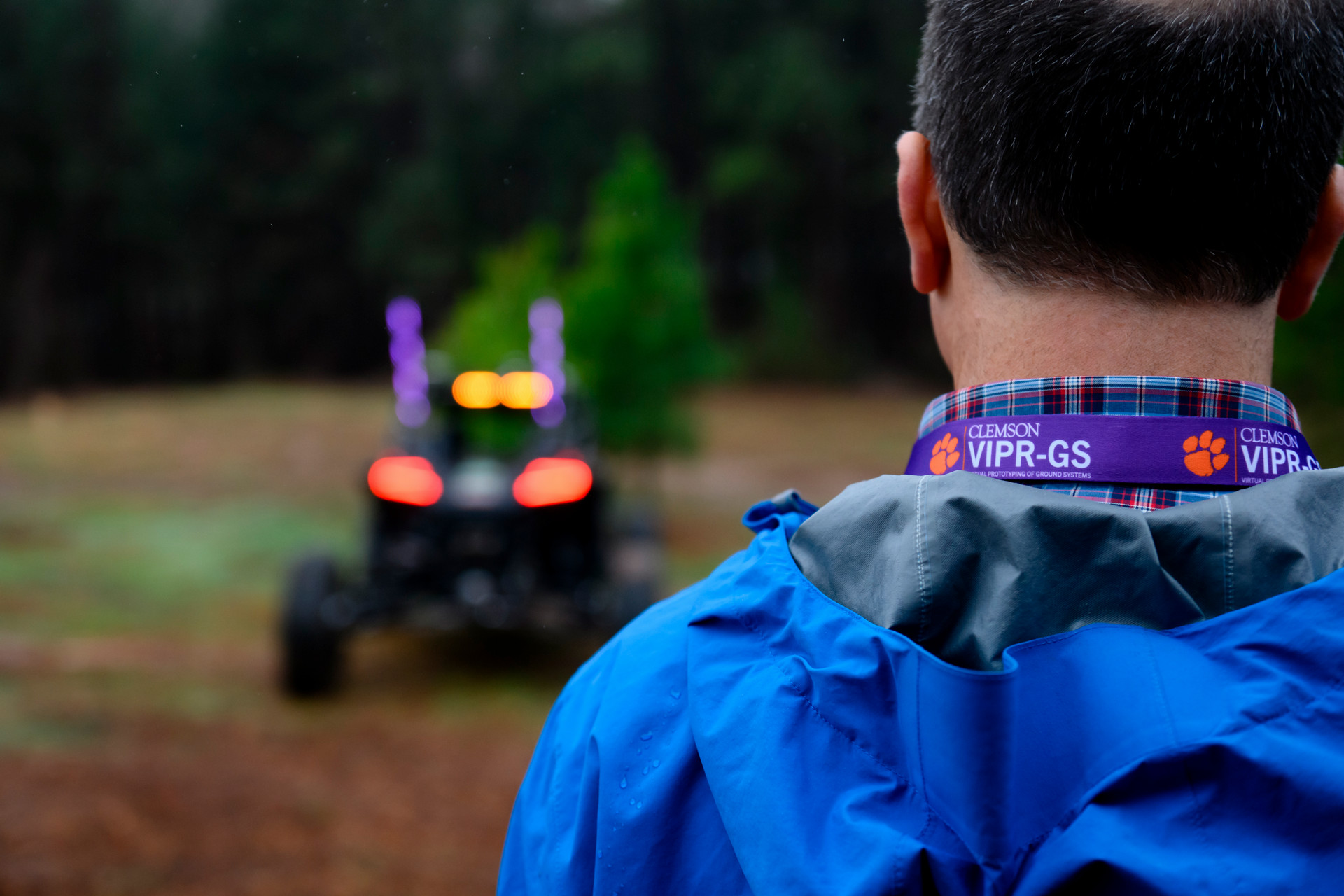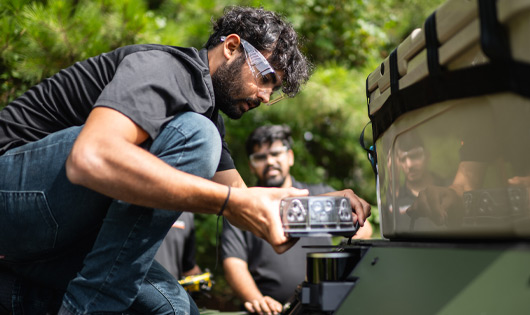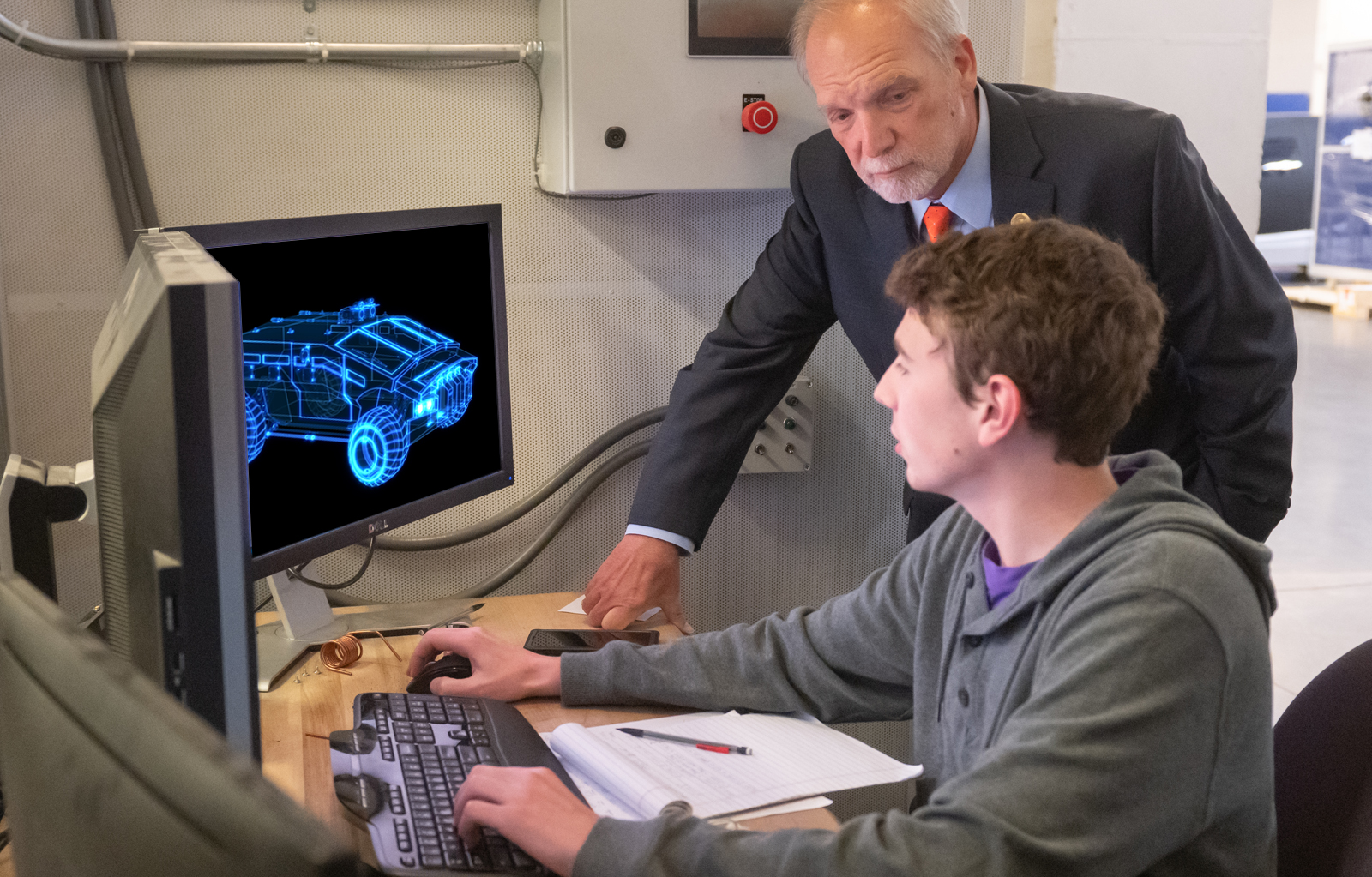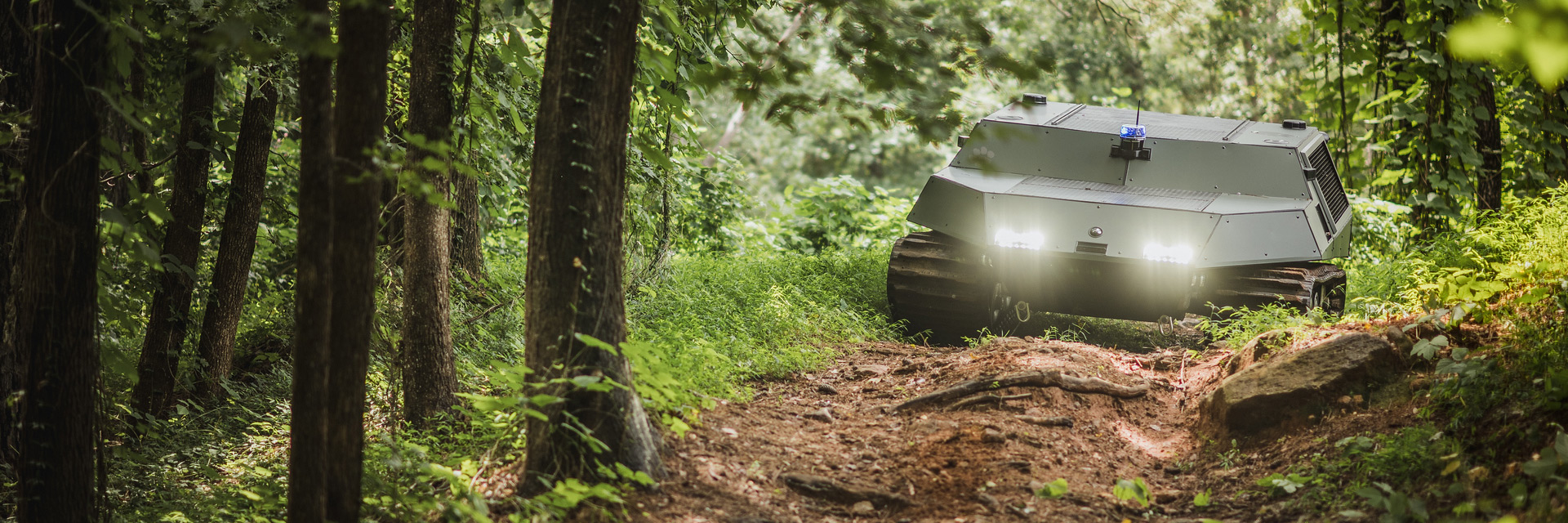VIPR-GS Internship
Background and Opportunity
The VIPR-GS Research Center is looking for Honors College student interns for the 2025/2026 academic year. For full consideration, apply before 11:59:59 on 30 June 2025.


About VIPR-GS
The VIPR-GS Research Center is a collaborative partnership between the U.S. Army’s Ground Vehicle Systems Center (GVSC) and Clemson University, dedicated to advancing transformational mobility. The Center’s vision is to establish VIPR-GS as a nationally recognized leader and Department of Defense Center of Excellence in Digital Engineering, driving the rapid development, integration, and deployment of advanced autonomous ground systems through cutting-edge research, innovation, and workforce development. Our mission is to deliver transformative research, industry collaboration, and talent development that positions the research center as a premier Digital Engineering Center of Excellence. We focus on integrating autonomy, propulsion and smart energy systems, human-machine teaming, cybersecurity, and digital twin technologies within a model-based systems engineering framework. VIPR-GS accelerates the prototyping and fielding of intelligent, resilient, and mission-ready mobility solutions for multi-domain operations. These efforts are aligned with the Army’s Next-Generation Combat Vehicle (NGCV) program, one of the top six priorities of the U.S. Military. The mission of the VIPR-GS Research Center is to develop innovative tools and methodologies for virtual and agile physical prototyping driven by research breakthroughs in off-road vehicle autonomy and vehicle propulsion, including smart fleet energy management. Our goals include providing new modeling and simulation capabilities, software tools, methodologies, and hardware demonstrations supporting GVSC’s research and development mandate. These efforts are aligned with the Army’s Next-Generation Combat Vehicle (NGCV) program, one of the top six priorities of the U.S. Military.
Learn more about VIPR-GSResearch Efforts
Primarily an engineering research effort, VIPR-GS has over 35 active research efforts with over 80 involved faculty members from the following departments:
| Programs | |
|---|---|
| Automotive Engineering | Mechanical Engineering |
| Chemical and Biomolecular Engr. | Physics and Astronomy |
| Chemistry | Psychology |
| Civil Engineering | School of Computing |
| Electrical and Computer Engr. | School of Math. and Statistical Sci. |
| Industrial Engineering | School of Mech. and Automotive Engr. |
| Materials Science and Engr. | |
We are seeking student interns eager to support research across these disciplines; however, some targeted opportunities are described below. Please note that applications will be accepted for all disciplines mentioned above, even if they are not included in the target list below. Applicants whose backgrounds and interests align with our research will be invited to interview with a faculty member. Highly ranked candidates will be offered the opportunity to conduct a research internship throughout the next academic year.
Interns will be expected to work 10 hours per week, collaborating with VIPR faculty and contributing to research efforts. Please note that weekly hours may vary depending on the student's schedule and research requirements. Compensation is set at $12.50 per hour. The VIPR-GS Research Center may also request interns' availability for feature spotlights, videos, and testimonials.
Current targeted opportunities:
- Computer Science, Mechanical Engineering, Electrical and Computer Engineering
- The objective of the project is to develop data-driven methods for the control of off-road vehicles. The application of the developed methods will be demonstrated on a real hardware platform.
- Relevant coursework includes control systems, optimization, signal processing, and computing.
- Specialized skills include experience coding in MATLAB or Python.
- Physical work location: in-person on main campus and occasional ‘field’ locations.
- Mechanical Engineering, Electrical and Computer Engineering
- This project will focus on the thermal and electrical modeling of battery modules and the integration with the vehicle. The detailed tasks include the implementation of battery state estimation algorithms, the communication with the battery disconnection unit and the electric control units, and the testing of the designed system.
- Relevant coursework includes Junior or Major in electrical or mechanical engineering
- Specialized skills and experience include: Battery experience is a great plus.
- Physical work location: CU-ICAR campus
- Mechanical Engineering, Electrical and Computer Engineering, Automotive Engineering, School of Computing
- The project develops and tests AI-based algorithms for managing battery packs (charging, balancing, diagnostics, thermal management). This involves hybrid model learning combining physics with real-time data, and learning optimal and adaptive management actions using various deep learning architectures.
- Relevant coursework includes systems dynamics, machine learning, and control systems.
- Specialized skills and experience include: familiarity with machine learning algorithms involving neural networks or willingness to learn quickly, and hands-on experience building test circuits (with batteries or other items), working with electrical hardware/test systems.
- Physical work location: Both in-person at CU-ICAR and remote (virtual) work is available.
- Physics, Mechanical Engineering, Materials Science and Engineering
- In this project, we are experimentally preparing BN-based thermal interface materials and evaluating them at different temperatures and charging rates. Our goal is to optimize the composite to achieve cross-plane conductivity of >15 W/mK, which is considered to be challenging. We are also employing novel machine learning methods to estimate thermal interfacial resistance.
- Relevant coursework includes solid-state physics, Heat transfer, and Fluid dynamics.
- Specialized skills and experience include: experience with battery modeling or machine learning is useful, but not necessary.
- Physical work location: G09 Kinard Lab of Physics on Clemson Main campus.
- Physics, Chemistry, Chemical Engineering, Materials Science and Engineering
- This project uses physics-based electrolyte models to uncover structure-property relationships to achieve a stable solid-electrolyte interface, low desolvation energy, and a high transference number. Silicon nanoquils – a novel form of nano-silicon – will be used as the anode active materials, which the intern will be trained to synthesize during their internship.
- Specialized skills and experience include: Students with a strong chemistry or chemical engineering background are preferred, although we can train students with another scientific background. No prior lab experience is required.
- Physical work location: Clemson Nanomaterials Institute, located at AMRL.
- Computer Science, Mechanical Engineering, Electrical and Computer Engineering
- Support for this opportunity requires Knowledge of Robot Operating System (ROS) and related sensors.
- This effort supports work on a full-scale off-road autonomous vehicle (POLARIS RZR) for data collection and autonomy testing.
- Both in-person (at CU-ICAR) and remote work are available.

Expectations
Interns will be expected to work 10 hours per week, collaborating with VIPR faculty and contributing to research efforts. Please note that weekly hours may vary depending on the student's schedule and research requirements. Compensation is set at $12.50 per hour. The VIPR-GS Research Center may also request interns' availability for feature spotlights, videos, and testimonials.
Apply HereApplication Requirements
Anticipated Timeline
- Student applications due by 30 June 2025
- Prospective faculty interviews to be conducted before 25 July 2025
- Final selection and award notification to Honors College interns by COB 5 August 2025
- Classes begin on 20 August 2025
Internship Selection Requirements and Rubric
- Applicants must be Clemson University Honors College students in good standing.
- Priority consideration will be given to upperclassmen.
- Student course discipline must align with VIPR-GS faculty research requirements.
- Due to the anticipated application volume, consideration will be based on the application submission date (first-come, first-served).
- Faculty interviewers will evaluate and rate applicants based on interview experience.
- Application completeness, clarity, and timeliness will be considered.
- Lucid and succinct written responses will be included in the evaluation.


